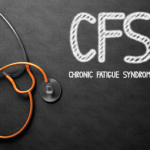However, the allied health professionals did not always agree on the presence of the five clinical signs. Overall, the researchers found that the accuracy for both allied health professionals was highest (88.3% for the experienced allied health professional and 80.9% for the inexperienced allied health professional) when using tests for only two signs: tender coelic plexus and postural/mechanical disturbances of the thoracic spine. The authors conclude that an allied health professional can quickly and simply examine for these physical signs and, thus, efficiently screen for CFS/ME.
They call for future studies to optimize the set of symptoms used for diagnosis.
ad goes here:advert-1
ADVERTISEMENT
SCROLL TO CONTINUE
Lara C. Pullen, PhD, is a medical writer based in the Chicago area.
Reference
ad goes here:advert-2
ADVERTISEMENT
SCROLL TO CONTINUE
- Hives L, Bradley A, Richards J, et al. Can physical assessment techniques aid diagnosis in people with chronic fatigue syndrome/myalgic encephalomyelitis? A diagnostic accuracy study. BMJ Open. 2017 Nov 13;7(11):e017521. doi: 10.1136/bmjopen-2017-017521.


